Suche von aktivitätsbasierten Emissionsfaktoren
In Scope 3 können Sie über eine externe Datenbank nach Emissionsfaktoren suchen und diese direkt in den Climate Hub übernehmen – mit oder ohne Unterstützung von KI.
Um in Scope 3 eine eigene Aktivität hinzuzufügen, können Sie den Button Faktor suchen (aktivitätsbasiert) nutzen. Mit diesem Button haben Sie die Möglichkeit, Faktoren aus einer externen Datenbank abzufragen. Die Suche nach ausgabenbasierten Emissionsfaktoren ist hier beschrieben.
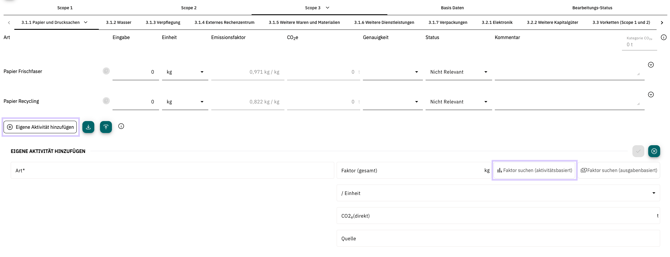
Beim Anklicken öffnet sich ein neues Fenster. Standardmäßig ist die manuelle Suche aktiv, es kann jedoch jederzeit in die KI-gestützte Suche gewechselt werden.
1. Manuelle Suche
Hier kann in englischer Sprache nach Schlüsselwörtern (Keywords) gesucht werden. Die Suchergebnisse, die auf exakter Textübereinstimmung basieren, lassen sich nach folgenden Kriterien filtern: Land (Region), Datenbank (Source), Jahr (Year), Einheit (Unit Type) und LCA Aktivität (LCA activity). Zusätzlich können Emissionsfaktoren nun nach Kategorien (z. B. building materials) und Sektoren (z. B. buildings and infrastructure) vorab gruppiert werden. Dies erleichtert das Durchsuchen der Faktoren, wenn der genaue Name des Faktors unbekannt ist.
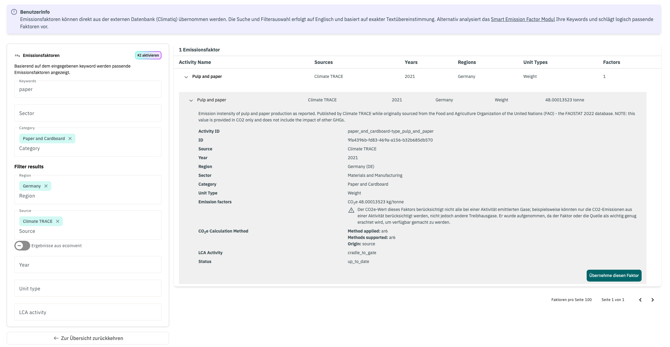
2. KI-gestützte Suche
Über den Button KI aktivieren kann in den smarten Modus gewechselt werden. Auch in diesem Modus kann nach Schlüsselwörtern in englischer Sprache gesucht werden. Die angezeigten fünf Suchergebnisse basieren auf logischen Zusammenhängen.
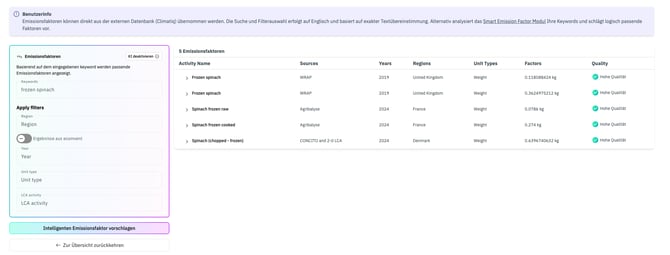
Hinweise zur Eingabe:
- Keyword: kann in Deutsch oder Englisch angegeben werden, oder in einer der folgenden Sprachen: Bulgarisch, Tschechisch, Dänisch, Niederländisch, Estnisch, Finnisch, Französisch, Ungarisch, Irisch, Italienisch, Lettisch, Polnisch, Slowakisch, Spanisch, Schwedisch, Mandarin-Chinesisch; wird bei Bedarf automatisch ins Englische übersetzt.
- Region, Year, Unit type, LCA activity: Auswahl über Dropdown Menüs.
Nach Bestätigung über Intelligenten Emissionsfaktor vorschlagen werden die 5 besten Vorschläge angezeigt. Ein grünes Icon signalisiert eine hohe Mapping-Qualität zwischen der eingegebenen Aktivität und dem vorgeschlagenen Emissionsfaktor, während ein oranges Icon auf eine niedrige Mapping-Qualität hinweist.
3. Weiteres Vorgehen
Wenn Sie einen passenden Faktor gefunden haben, können Sie sowohl in der manuellen als auch in der KI-gestützten Suche diesen durch Klicken auf den Button Übernehme diesen Faktor in den Climate Hub übernehmen. Alle relevanten Infos, die für die Nachvollziehbarkeit wichtig sind, werden anschließend im Climate Hub angezeigt. Dort haben Sie auch die Möglichkeit der Aktivität einen eigenen Namen (Art) zu geben.
Es ist zu beachten, dass bei der Übernahme eines Faktors aus der KI-gestützten Suche die KI-Logik zurückgesetzt wird. Das bedeutet, die verbleibenden vier Vorschläge werden nicht gespeichert und es besteht keine Verbindung mehr zur ursprünglichen KI-Suche.
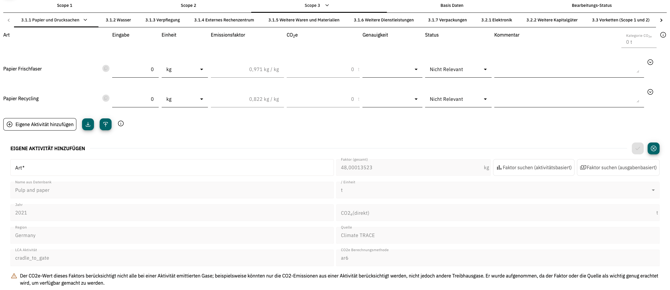
Durch das Klicken des Häkchens erscheint die Aktivität in der Übersicht und das Unternehmen kann seine Vebrauchswerte in der Spalte Eingabe eintragen und die Einheit des Eingabewertes auswählen. Die Emissionen werden dann automatisch ermittelt. Diese können zur ersten Einschätzung in der Anzeige in der rechten oberen Ecke eingesehen werden:

4. Weitere Informationen
- Details zur externen Datenbank von Climatiq finden Sie auf der offiziellen Website.
- Eine Dokumentation der KI-Schnittstelle finden Sie hier.
Risiken bei der Nutzung der KI-Funktion
Die Nutzung der KI-gestützten Emissionsfaktorensuche kann zu ungenauen oder unvollständigen Ergebnissen führen, insbesondere wenn Bezeichnungen unsauber oder mehrdeutig sind. Zudem können regionale Unterschiede oder neuere Datenquellen unberücksichtigt bleiben. Daher sollten alle KI-Vorschläge sorgfältig geprüft werden, bevor sie für Berichte oder Entscheidungen genutzt werden. Die Verantwortung für die finale Auswahl des Emissionsfaktors liegt stets bei den Anwender:innen. - Beschreibung zur Datenqualität:
-
Emissionsfaktoren können entfernt werden wenn sie als unbrauchbar oder stark fehlerhaft eingestuft werden. Solche Faktoren erscheinen dann auch nicht mehr im Climate Hub.
-
Emissionsfaktoren, die potentielle Probleme aufweisen, werden mit einem Qualitätskennzeichen versehen.
-
Unvollständige Berücksichtigung von Emissionen
Der CO2e-Wert eines Emissionsfaktors berücksichtigt nicht alle bei einer Aktivität ausgestoßenen Gase. Beispielsweise könnten nur die CO2-Emissionen einer Aktivität einbezogen sein, während andere Treibhausgase unberücksichtigt bleiben. Dennoch wird der Faktor bereitgestellt, da er oder die Quelle als wichtig genug angesehen wird. Weitere Informationen finden Sie in der Beschreibung des jeweiligen Faktors, oder können in der dazu angegebenen Quelle nachgelesen werden.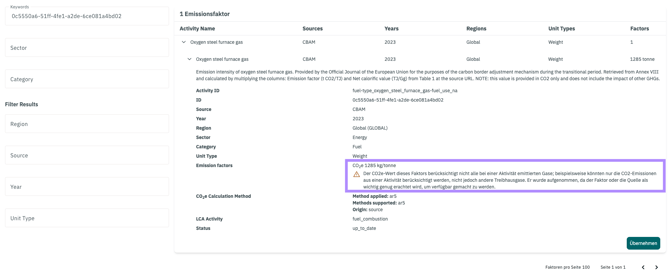
-
Climatiq hat potenzielle Probleme in der Methodik eines Emissionsfaktors festgestellt. Dies könnte daran liegen, dass die Methodik von allgemein anerkannten Standards abweicht oder die Quelle keine klaren Angaben zur verwendeten macht. Weitere Informationen finden Sie in der Beschreibung des jeweiligen Faktors, oder können in der dazu angegebenen Quelle nachgelesen werden.
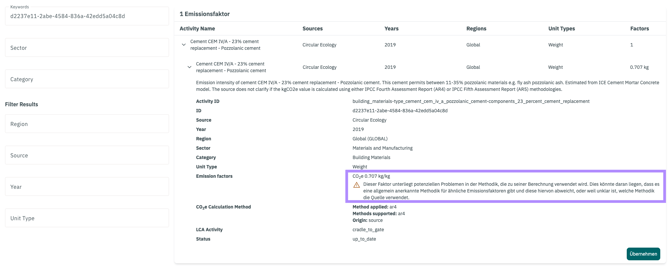
-
-
- Beschreibungen der verwendeten Sub-Datenbanken:
| data base | data type | description |
| ADEME | activity-based | ADEME (Agence de la transition écologique) is the French Agency for Ecological Transition and offers a wide range of emission factors to support the measurement and reduction of greenhouse gas emissions in France. These emission factors are used to estimate greenhouse gas emissions associated with various activities, such as energy consumption and transportation. |
| Agribalyse | activity-based | Agribalyse is a comprehensive database developed by ADEME (Agence de la transition écologique), offering detailed environmental impact assessments of food products. This resource provides extensive data on the life cycle of food items, including production, processing, and distribution stages, to support informed choices towards sustainable consumption. |
| AIB | activity-based | The Association of Issuing Bodies (AIB) is a European organisation that manages and promotes the use of energy attribute certificates to track the production and consumption of renewable energy in Europe. The AIB produces the European Residual Mix Report which includes data on the mix of fuels used to generate electricity in each European country, as well as the associated greenhouse gas emissions. |
| AusLCI | activity-based | The Australian National Life Cycle Inventory Database (AusLCI) developed by the Australian Life Cycle Assessment Society (ALCAS) provides environmental data on Australian products and services across their full life cycle. |
| BAFA | activity-based | The German Federal Office for Economic Affairs and Export Control (BAFA) publishes annually updated CO2 emission factors to support consistent reporting and monitoring of energy and resource-related greenhouse gas emissions across regulatory, funding, and compliance programs in Germany. Note: The CO2 factors are not universally valid and are not intended for the preparation of scientific papers in particular. |
| BEIS | activity-based, spend-based | The UK Government issues emission conversion factors for use by UK and international organisations to report on greenhouse gas emissions. The key responsible departments / agencies are / were: BEIS , DEFRA, DESNZ and NAEI. |
| CAEP | activity-based | The Chinese Academy of Environmental Planning (CAEP) is a public institution that conducts crucial research and offers policy recommendations on environmental issues to the Chinese government and corporations, playing a significant role in developing China's environmental strategies. |
| CBAM | activity-based | The European Union's Carbon Border Adjustment Mechanism (CBAM) is a regulatory tool designed to measure carbon emissions attributed to the production of high-carbon goods imported into the EU, aiming to promote cleaner practices in industrial production across non-EU countries. To this end, the European Commission publishes emission factors providing the necessary metrics for compliance and environmental integrity. |
| CCF | activity-based | Cloud Carbon Footprint is a free and open-source emissions measurement and analysis tool. It provides emission factors and methodology for measuring the emissions of Amazon Web Services (AWS), Microsoft Azure, and Google Cloud Platform (GCP). |
| Circular Ecology | activity-based | Circular Ecology offers resource efficiency services, including carbon footprinting, water footprinting, life cycle assessment (LCA), circular economy and general resource efficiency. |
| Climate TRACE | activity-based | Climate TRACE (Tracking Real-Time Atmospheric Carbon Emissions) is a collaborative initiative aimed at providing precise, real-time tracking of global greenhouse gas emissions using artificial intelligence, satellite image processing and other remote sensing technologies along with academic research and publicly available data. |
| Climatiq | activity-based | |
| CLP Group | activity-based | The CLP Group is a Hong Kong-based power company that generates electricity from a variety of sources, including coal, gas, nuclear, and renewable energy. The company conducts greenhouse gas emissions accounting and reporting and provides data on its emissions performance. |
| CONCITO and 2-0 LCA | activity-based | CONCITO is Denmark’s leading climate and environmental research organisation that developed the Big Climate Database v1.2 in collaboration with 2.-0 LCA consultants. The database provides greenhouse gas emission factors for over 500 food products across multiple European markets based on life cycle assessments from production to retail to support sustainable consumption choices. |
| Covenant of Mayors | activity-based | The Covenant of Mayors collection provides supporting data for the Covenant of Mayors for Climate and Energy (CoM) initiative. This dataset provides updated emission factors for national electricity consumption (also referred to as National and European Emission Factors for Electricity - NEEFE). |
| CO2 Emissiefactoren | activity-based | CO2emissiefactoren.nl is a collaborative platform initiated by Milieu Centraal, Stichting Stimular, SKAO, Connekt, and the Dutch government, providing reliable CO2 emission factors to promote sustainable decision-making in the Netherlands. |
| CT | activity-based | Climate Transparency is a global partnership organisation funded by the German Government, World Bank, and several other bodies. It seeks to stimulate climate action in G20 countries through enhanced transparency. The Climate Transparency Report annually provides the emission intensity of electricity generation for various countries, based on the emissions from the respective grid mix. |
| DEWA | activity-based | The Dubai Electricity and Water Authority (DEWA) is a government-owned utility company that provides electricity and water services to the emirate of Dubai in the United Arab Emirates. It is responsible for implementing policies and initiatives related to energy and water supply and conservation and promoting the use of renewable energy sources in Dubai. |
| DISER | activity-based | The Australian Government issues emission conversion factors for use by Australian and international organisations to report on greenhouse gas emissions. The key responsible departments / agencies are / were: DISER and DCCEEW. |
| DiXi Group (Green Transition Office) | activity-based | Τhe Green Transition Office is an independent advisory body under Ukraine’s Ministry of Economy implemented by NGO DiXi Group and supported by UK International Development. Publishes methodologies and country-specific GHG data including electricity emission factors to support policy and corporate reporting in Ukraine. |
| EEA | activity-based | The European Environment Agency (EEA) is an EU agency that provides independent scientific and technical information to support environmental policies and sustainable development in Europe through data analysis, assessment, and reporting. |
| EEI | activity-based | The Edison Electric Institute (EEI) is the association that represents all U.S. investor-owned electric companies. EEI has developed a database to support corporate sustainability reporting, especially in calculating scope 2 emissions for specific US electricity suppliers. |
| Electricity Info | activity-based | ElectricityInfo.org is an independent website providing consumers with environmental information on the UK electricity supply industry including emission factors of fuel mix electricity data so they can make an informed choice about their electricity supply. |
| EMA | activity-based | The Energy Market Authority (EMA) is a statutory board under the Ministry of Trade and Industry in Singapore. They issue average CO2 emission emitted per unit of electricity. |
| EPA | activity-based, spend-based | The Environmental Protection Agency (EPA) is the United States government agency that provides regularly updated default emission factors for organisational greenhouse gas reporting in the United States. |
| EPPO | activity-based | The Energy Policy and Planning Office (EPPO) of Thailand issues the average CO2 emission emitted per unit of electricity. |
| EXIOBASE | spend-based | EXIOBASE is a global, detailed Multi-Regional Environmentally Extended Supply-Use Table (MR-SUT) and Input-Output Table (MR-IOT). It was developed by harmonising and detailing supply-use tables for a large number of countries, estimating emissions and resource extractions by industry. Subsequently, the country supply-use tables were linked via trade creating an MR-SUT and producing MR-IOTs from this. The MR-IOT can be used for the analysis of the environmental impacts associated with the final consumption of product groups. |
| GEMIS | activity-based | GEMIS, or the Global Emission Model for Integrated Systems, is a comprehensive life cycle assessment (LCA) software tool developed by IINAS, the Institute for Integrated Environmental Assessments. The tool is designed to analyse and model the environmental impacts of various technologies, products, and services. GEMIS covers a wide range of sectors, including energy, transport, materials, and agriculture, among others, providing reliable and consistent emission factors. |
| GHG Protocol | activity-based | The GHG Protocol is the de-facto standard-setting organisation for greenhouse-gas accounting. As well as producing guidance on estimating and categorising emissions, it also provides a set of the most commonly-used emission factors including energy consumption, transportation, waste management, and industrial processes. |
| GLEC | activity-based | The Global Logistics Emissions Council (GLEC) is a partnership between industry, government, and non-governmental organisations that aims to develop and promote a standardised approach for measuring and reporting greenhouse gas emissions from logistics supply chain activities, including freight transport by road, rail, air, and sea. |
| activity-based | Google is a global internet services company. They calculate and publish carbon emissions associated with their operations in their data centres, using hourly grid mix and carbon intensity data from Electricity Maps. | |
| Government of Canada | activity-based | Environment and Climate Change Canada (ECCC) is the department of the Government of Canada responsible for coordinating environmental policies and programs as well as enforcing environmental regulations. Canada's Official Greenhouse Gas Inventory offers comprehensive data and insights on Canada's environmental footprint through greenhouse gas emission records. |
| Green-e | activity-based | Green-e is a certification program in the United States focusing on renewable energy and carbon offset products and services, providing greenhouse gas emission factors for energy sources such as electricity. |
| Greenview | activity-based | Greenview is a sustainability platform that provides the Hotel Footprinting Tool, utilizing data from over 27,000 hotels in the Cornell Hotel Sustainability Benchmarking index. |
| HKEI | activity-based | HKEI (Hong Kong Electric Investments) is a Hong Kong-based power company that generates electricity from coal and gas. The company reports the carbon dioxide emissions factor for the electricity it generates and supplies to customers, which is calculated based on the emissions from its power plants. |
| ICM Database | activity-based | The Integrated Carbon Metrics (ICM) Database is an Australian-specific life cycle inventory providing carbon footprint intensities for construction and building materials. It includes results from both a process method (based on AusLCI process data) and a hybrid method (combining process data with input-output data to capture upstream activities). |
| IPCC | activity-based | The Intergovernmental Panel on Climate Change (IPCC) is a United Nations body that assesses the scientific evidence related to climate change and offers guidance to governments and policymakers on climate-related issues. IPCC provides a range of emission factors in their reports including energy-related emissions, industrial processes, agriculture, and land use and waste management activities. |
| Market Economics Limited | spend-based | Market Economics Limited is an independent New Zealand-based consultancy that specialises in market and economic analysis and environmental and ecological research. |
| MfE | activity-based | The Ministry for the Environment (MfE) is the government agency responsible for environmental policy and regulation in New Zealand, providing guidance and resources on greenhouse gas (GHG) accounting and reporting including emission factors of different GHG emissions sources. |
| Netherlands Enterprise Agency | activity-based | The Netherlands Enterprise Agency (RVO) is a government agency, part of the Dutch Ministry of Economic Affairs and Climate Policy. It fosters sustainable business practices by offering crucial resources. |
| NVE | activity-based | The Norwegian Water Resources and Energy Directorate (NVE) provides emission factors for greenhouse gas (GHG) accounting, covering physically delivered electricity and supplier-specific disclosures, enabling assessment of Norway’s electricity-related emissions. |
| OEKOBAUDAT | activity-based | The German Federal Ministry for Housing, Urban Development, and Building provides the OEKOBAUDAT, an extensive database of emission factors for materials and equipment used in construction and building design. |
| OpenIO-Canada | spend-based | OpenIO-Canada is an open-source, Environmentally Extended Input-Output (EEIO) model and tool designed to estimate the life cycle impacts of products and services in Canada. |
| PCAF | activity-based | The PCAF European Building Emission Factor Database provides financial institutions with emission factors for mortgages and real estate across Europe, enabling measurement and tracking of financed emissions by country, building type, and energy performance. |
| Plastics Europe | activity-based | Plastics Europe is the association of European plastics manufacturers. It maintains the Public LCI Database which provides open life cycle inventory data for plastics and related production processes in Europe to support environmental assessments. |
| SEFR | activity-based | The Singapore Emission Factors Registry (SEFR) is a collaborative initiative led by the Singapore Business Federation (SBF) in partnership with government agencies and industry stakeholders. It consolidates emission factors across various sectors to assist businesses in accurately calculating their greenhouse gas emissions. |
| STC-Nestra B.V. | activity-based | STC-Nestra B.V. is a consulting and engineering firm based in the Netherlands that specialises in sustainable transport solutions. One of the services offered by STC-Nestra B.V. is the calculation and reporting of transport emissions, such as greenhouse gas emissions associated with sea transport. |
| UBA | activity-based | The Umweltbundesamt (UBA) is the Federal Environment Agency of Germany and is responsible for promoting sustainable development through scientific research, providing advice on a wide range of environmental issues to the government, businesses, organisations, and the public. The UBA reports emission factors for electricity, fuel, and transport among others. |
| UBA Austria | activity-based | The Environment Agency Austria (Umweltbundesamt) publishes official greenhouse‑gas inventories and sector-specific emission factors, based on national reports submitted under the UNFCCC and EU regulations, to support transparent, policy‑aligned GHG accounting across Austria. |
| UNECE | activity-based | The United Nations Economic Commission for Europe (UNECE) is one of the regional commissions of the United Nations, focused on improving economic relationships between European countries and enhancing cooperation for sustainable development. Among its various publications is the document on Integrated Life-cycle Assessment of Electricity Sources, which provides comprehensive emission factors for different electricity generation methods. |
| UNEP | activity-based | The United Nations Environment Programme (UNEP) is the United Nations’ leading global authority on the environment driving transformational change on the planetary crisis. The Ozone Secretariat publishes data on gases regulated under the Montreal Protocol. |
| WRAP | activity-based | WRAP provides a comprehensive database for scope 3 food and drink emission factors, employing a consistent methodology that enables businesses to measure and track their supply chain greenhouse gas (GHG) emissions. To form this comprehensive repository, WRAP synthesizes information from numerous distinct sources including academic publications among others. |
![VERSO_Logo-1.png]](https://helpdesk.verso.de/hs-fs/hubfs/Globale%20Design-Elemente/VERSO_Logo-1.png?height=50&name=VERSO_Logo-1.png)